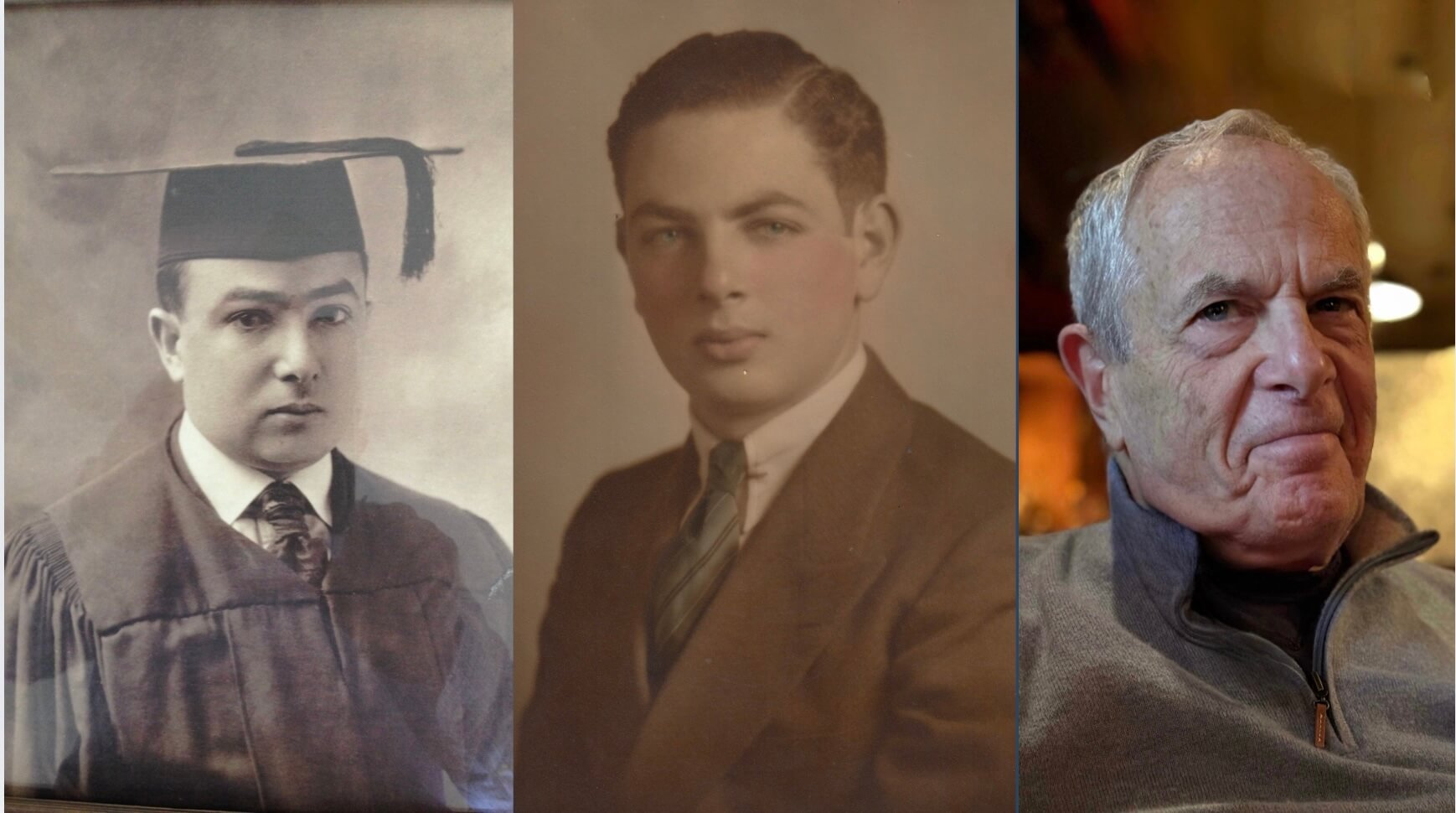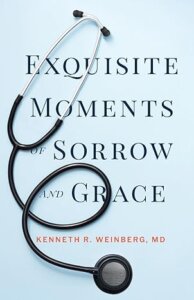In just one family, four generations of Jewish doctors
Author and physician Ken Weinberg has inherited a history of compassion that started with his grandfather Misha

From Left: Misha, Clarence and Ken Weinberg. Courtesy of Ken Weinberg
In the early part of the 20th century, Misha Weinberg fled the pogroms in Belarus and came to New York where he worked as a subway motorman while going to medical school. When Weinberg moved to Newark in 1920 and set up an office as a general practitioner, he didn’t know it at the time but his compassionate house calls to the poor in Newark’s Black and Jewish communities would start a family legacy. His son, grandsons and a great grand-daughter became doctors.
This is all chronicled in Exquisite Moments of Sorrow and Grace, a memoir by Kenneth Weinberg, one of Misha Weinberg’s grandchildren, after a 30-plus year career spent in emergency rooms and urgent care centers. Weinberg, who is 77 and divides his time between Manhattan and the Berkshires, is a practitioner of narrative medicine, an interdisciplinary approach to healthcare that emphasizes the importance of understanding and engaging with patients’ personal stories.
Fran Heller, a retired Columbia Presbyterian Hospital palliative care social worker, told me that the narrative medicine approach helped Weinberg become an especially good diagnostician, something that is crucial in the emergency room.
“Kenny’s involvement with the discipline of narrative medicine enabled him to truly listen to his patients and ‘read’ them,” said Heller, who spent 18 years with Weinberg in a narrative medicine group that met regularly at the hospital. “This practice really helped him to get to know and understand them as whole people in the context of their complicated lives, and not just to see them as patients or a presenting disease.”
A compassionate approach
Misha Weinberg, the family patriarch, was called Papa Misha by his grandchildren. An Orthodox Jew, he decided not to circumcise the first two of his three sons born in America. Weinberg’s survival instinct told him to forego the Jewish ritual in case there were pogroms in America, too.

According to the book, the smartest of Misha Weinberg’s three boys was the eldest son Arthur, but Arthur’s eyesight was so bad he couldn’t read medical books and instead became an X-ray technician for the International Ladies Garment Workers Union in Newark. The youngest son Martin followed Arthur into the X-ray field, selling and repairing X-ray equipment. The middle son Clarence was named after the famous civil liberties lawyer Clarence Darrow. He did go to medical school and became — wait for it — a radiologist. (He stayed with relatives while attending medical school in Michigan. The Weinberg boys’ uncle Manny Seidler ran in the 1948 Michigan gubernatorial election as a socialist and served as campaign manager for all of socialist Norman Thomas’ presidential campaigns.)
The family’s compassionate approach to medicine appears to have its origin in Newark where Papa Misha often concluded house calls without collecting a fee.
“When he was walking out the door, if they said to him, ‘Doc, how much do I owe you?’ he could get a sense of how much they could afford,” Martin Weinberg told his nephew Ken. “And if they didn’t say anything to him and looked down, he would not charge them because he knew they couldn’t afford to pay.”
Such a saintly approach to commerce may be hereditary. Papa Misha is said to be a descendant of the Baal Shem Tov.
We learn that Clarence Weinberg, too, had compassion for those who have fallen on hard times. A flight surgeon during World War II who refused to talk about the experience with his sons, Clarence was moved by the plight of Cuban physicians who fled the island when Fidel Castro came to power. As the head of the radiology department at Newark City Hospital, he took some under his wing.
“He brought them in as radiology technicians and then helped them get their licenses and their practices going,” Ken Weinberg told me.
In addition to Ken, both of Clarence’s other sons went into medicine. Neil Weinberg was an acupuncturist and practitioner of Chinese Medicine. Marc Weinberg, who passed away in 2015, was a physician in Florida who had one foot in the world of alternative medicine and had the ability to “feel your aura,” Weinberg said. Weinberg’s niece Sara — Misha Weinberg’s great granddaughter — became a doctor who describes herself as a gynecologist committed to treating the “underserved and vulnerable,” regardless of insurance status.
A transformation on Yom Kippur
All together Weinberg put in 30 years working at emergency rooms and urgent care facilities, beginning in the early 1990’s at Holy Name Hospital in Teaneck where he claims he was let go because he cost too much.
One of the things Weinberg says he liked about working at urgent care facilities was that he, like Papa Misha, got to make house calls. But his memoir blasts what he calls understaffed, underfunded and undersupplied urgent care facilities that are set up as capitalist enterprises.
“We worked up to 14-hour shifts. And they just wanted you to see one patient after another,” Weinberg said. “I’d go into work and there’d be no x-ray technician. There’d be no lab technician, there wouldn’t be enough supplies — I don’t want to paint with too broad of a brush, but the sense one gets being there at these urgent care centers was that they knew that we’d make do, they knew we’d work things out.”
His experience working in emergency medicine and urgent care has made him a vociferous advocate for universal healthcare and single payer insurance, Weinberg said. Weinberg has long been involved with Physicians for a National Health Program, which advocates for comprehensive, single-payer national health insurance.
“It doesn’t take long to see the horrors of people who wait to have things taken care of because they can’t afford healthcare,” he told me.
One of the more emotional patient encounters Weinberg reconstructs in the book involved a standup comic who had testicular surgery prior to showing up at an urgent care center on Yom Kippur when Weinberg was at the end of a 12-hour shift. The patient needed his post-operative wounds attended to.
“I found myself,” Weinberg writes, “on this holiest of days, washing him, and feeling us bond while I scrupulously cared for the wounds.
“It was as if I was being given the chance to wash away my own transgressions from the past year. I found myself transformed,” he continues, “and I left work that night feeling refreshed, uplifted, and absolved. As I walked home, I realized it was my own perfect Yom Kippur.”
Heartbreaking moments
Over the course of his career, Weinberg treated a number of frum Jews whose strict observance of traditional Jewish law appears to have complicated their medical care. His ultra-Orthodox patients include a right-handed man who refused to sign the HIPPA form required for treatment on Shabbos and got around it by using his left hand.
When Weinberg was toiling in the urgent care centers, he met a Hasid who smoked weed to cope with his Inflammatory Bowel Disease and a rabbi who was convinced that the Burning Bush mentioned in the Old Testament was cannabis.
In recent years Weinberg has been part of a medical practice that specializes in cannabis, working with elderly patients suffering from dementia and autistic children.
One of the more delightful family moments recounted in the memoir is the time Weinberg was home from college and convinced his mother to share a joint with him. But there are also family vignettes that are heartbreaking. Weinberg recalls his father administering a fatal dose of morphine to his grandmother who was destined to be on life support for the rest of her life. Elsewhere in the book he describes his father on his deathbed.
“My mother lay down next to him, kissed him and told him she loved him,” Weinberg writes. “Tears came to his eyes, and he stopped breathing.”
















